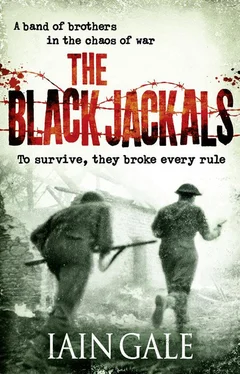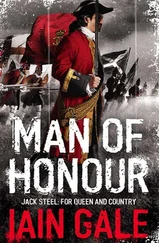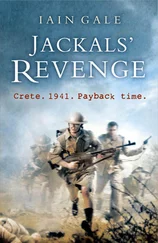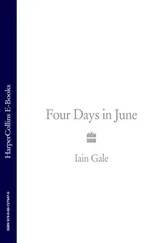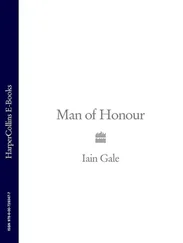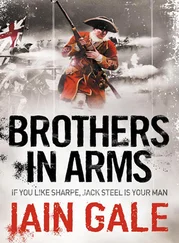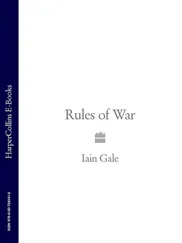1 ...7 8 9 11 12 13 ...17 ‘All right, you lot. Fall out and take a rest.’
The men moved to the side of the road, removed their packs and sat on them, most of them flipping open breast pockets to take out a packet of Woodbines or Gold Flake. Others lay back in the sunshine, feeling its warmth now as welcome rather than oppressive. They were hungry and thirsty and they all needed a shave, but at least they were safe. Lamb opened a pocket and pulled out a silver cigarette case packed with Craven As – a wedding present from Julia, engraved on the lid with both of their initials. He took one out, tapped it twice on the tin and lit up, enjoying the bitter taste as the smoke circulated through mouth and nose.
He turned to Bennett, who was lighting his own cigarette. ‘How are we off for rations, Sarnt?’
‘We’re all right, sir. Down to about two days’ worth a man, I should say. That’s bully and biscuit mainly.’
‘Well, that should do us. I dare say we’ll find the Company soon. Or even the Battalion. They can’t be more than a day’s march ahead of us.’
‘Hope so, sir. The men are feeling a bit adrift.’
‘Well, Captain Fortescue assured me that they withdrew along this road. So the best we can do is follow them. ’Fraid you’ve only got me for now.’
Bennett smiled. ‘That’ll do us, sir.’
He finished his cigarette and threw the butt to the ground, grinding it out with the sole of his boot before opening the map case that hung at his side and drawing out the precious road map. He opened it up and peered at a square. Bennett joined him. ‘We’re here, by my reckoning, just south of Brussels. Seems that the order is to regroup at Tournai, which is here. About thirty miles away.’ Giving one edge of the map to the sergeant, Lamb pointed at the square. ‘There’s a village up ahead. Looks like Rixensart. Reckon we might even find the Company there, Sarnt. They can’t have gone too far.’
‘Looks hopeful, sir.’
‘Right then. Let’s get them up.’ He folded the map and replaced it in the case.
Bennett yelled, ‘Come on, lads. On yer feet. Let’s keep going.’
There were a few groans and one comment of ‘slave driver’ and ‘don’t he know there’s a war on’ from unknown grumblers that earned a shout from Corporal Mays. But without much trouble the platoon got back on the road.
The town that lay ahead of them was nothing remarkable. The countryside quickly gave way to a street lined with small terraced houses typical of the region. There was a church to the right and on the left a large open area of parkland that at one point he thought might have belonged to a château.
Lamb scanned the street and saw no one. No civilians, and certainly no sign of any military personnel. He turned to Smart, who was behind him with the RT. ‘Bit strange, Smart, don’t you think?’
They entered in textbook formation with Corporal Mays and No. 1 section up front, then twenty-five yards behind Lamb’s HQ group, including Valentine and Briggs. Then came Sergeant Bennett with the mortar crew, and finally the two other sections each led by a lance corporal, one either side of the road, Valentine’s bringing up the rear.
Lamb slowed the pace and they walked into the town. Still there was no sign of the inhabitants.
Smart spoke. ‘Looks like they’ve upped sticks and gone, sir. Perhaps they knew we was coming.’
It certainly looked as if the population had left in a hurry. A few bags had been forgotten and stood forlorn outside a house whose door swung on its hinges.
Papers blew across the street and a cat crossed his path. He looked up and saw that most of the houses had been shuttered, although what use that might have been, had it been the Germans and not his platoon who had arrived, he could not think.
Bennett came up. ‘They’ve gone, sir. Everyone. Cleared out. Not long ago, neither. Coffee’s still hot in the pots.’
‘Yes, Sarnt. So it would seem. Smart, any joy with the RT?’
‘Nothing, sir. Dead as a doornail.’
‘I suppose there’s nothing to be done but to carry on, Sarnt. Our chaps must have come through here in a hell of a hurry.’
‘Perhaps that’s why the civvies all cleared out, sir, if they saw the British army running away like that, sir. Well, stands to reason they’d want to leg it too.’
Lamb knew that he was right. ‘Tournai is due west. We’ll take a left turn here, Sarnt.’
Bennett barked the order as if he were on the parade ground at Tunbridge Wells, and his words echoed through the silent streets. The men wheeled down the road past the park and were soon clear of the houses and in open countryside once again.
On they marched, crossing a major road packed with civilians heading north west towards Brussels. They reminded Lamb of the people on the bridge, of the little girl with the doll and the pretty young woman in the red skirt, and again he felt the shame boiling inside him. As they waited for a gap in the column, the men stared at the refugees and Lamb realised that the sight would have an irreversible effect on their morale.
He turned to Bennett. ‘Can we get a song together? Might gee up the men as they march.’
‘Think we can manage it, sir. Stubbs is our best singer. What shall we have?’
‘Oh I don’t know. Something from the last war, perhaps? “Tipperary” or “Pack up Your Troubles”?’
‘What about “The Siegfried Line”, sir? That’s a good ’un. The lads like that.’
‘All right, Sarnt. Make it that one then.’
Bennett went over to Stubbs, who was carrying the 2-inch mortar on his shoulder, and had a quiet word in his ear. Within seconds, as they at last began to cross the main road, edging with care through the civilians, he had begun to sing:
‘We’re going to hang out the washing on the Siegfried Line.
Have you any dirty washing, Mother dear?
We’re going to hang out the washing on the Siegfried Line, Cos the washing day is here . . .’
Without prompting the men joined in, all of them familiar with the words of the song which had filled the cinema screens on their last leave. Lamb, though, felt its full irony. Nevertheless he joined in, singing as loudly as he could so that the men would hear him. When the song was over Thompson started up another, ‘Run Rabbit Run’, a real crowd-pleaser. In the chorus Smart yelled ‘bang’ at the appropriate place and raised a smile. They were in better spirits now, he thought, and it made the distance seem less.
Looking ahead, through the lines of grey refugees, Lamb thought that he saw a figure in a helmet. Then another. He could see rifles now and shouted to Bennett, ‘Soldiers. Up ahead. Can you see? What are they?’
Both men looked hard through the milling throng of civilians and past the horses, carts and vehicles. It was true. There were soldiers, and the first thing he saw was the colour of their uniforms. Khaki. Lamb smiled with relief and recognised their helmets as British. ‘It’s all right, Sarnt. They’re ours.’
The men were dawdling along in front of them, moving even slower than the refugees, and Lamb and his men were able to catch up with them quickly. He accosted the last of them, a corporal: ‘Corporal.’
The man spun round and, recognising an officer, saluted before yelling out to his mates, ‘Oi, get the Sergeant. There’s an officer here.’ The other men came running.
There were six of them, but it became instantly apparent that they were not from the same unit. As the sergeant made his way back, Lamb spoke to the corporal. ‘Who are you?’
‘Stanton, sir. Lancashire Fusiliers. We’re all sorts really. Lost our units.’
‘Right, Corporal Stanton. Well, we’re adrift too. You’d best fall in with us for the time being.’
The sergeant, a Scot, had arrived by now and saluted Lamb. ‘Sergeant McKracken, sir, 1st Royal Scots. Got knocked out up near Limal by a shellburst, sir, and when I came to the platoon had gone. You’ve met Corporal Stanton, sir, and then there’s another from his mob, Driscoll. Then there’s two from the North Staffs, Blake and Mitchell, and there’s Archer. He’s a gunner. Gone a bit deaf – from the shelling, sir.’
Читать дальше
